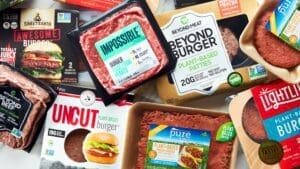 Over the years, sustainability has been increasingly embraced by consumers and brands alike. For many, this has caused them to re-examine the foods that they eat. In recent years, there has been tremendous growth in the plant-based meat market, with new entrants joining those that have been around for decades. The plant-based meat supply chain is taking advantage of hiccups in traditional food supply chains, especially during the Covid pandemic.
Over the years, sustainability has been increasingly embraced by consumers and brands alike. For many, this has caused them to re-examine the foods that they eat. In recent years, there has been tremendous growth in the plant-based meat market, with new entrants joining those that have been around for decades. The plant-based meat supply chain is taking advantage of hiccups in traditional food supply chains, especially during the Covid pandemic.
The plant-based meat market has been around since 1896, when Nuttose was launched by Dr. John Harvey Kellogg. Nuttose was the world’s first canned meat alternative and was primarily made from peanuts. When most people think of plant-based meat alternatives, the first names that come to mind are generally Morning Star and Boca, the makers of faux meat burgers, sausages, and chicken patties. Over the last five years, the number of entrants to the market has surged, with companies looking to make their plant-based meat substitutes more “meaty.”
Beyond Meat won a patent in December 2016 for a process of producing a “nutrient-dense meat structured protein product.” This process creates a more “meat-like” appearance and feel, even ensuring a juicy, pink center when the burger is cooked. Impossible Foods won its own patent for a ground-beef like product that promises a similar result. I have actually eaten both of these, and while the burgers are pretty tasty, the sausages are fantastic. And they both have that “meat-feel” when consumed. Even the big meat packers and producers have begun to explore the production of plant-based meat alternatives.
On a side note, while it is not a plant-based meat alternative, Memphis Meats won a paten earlier this year for an in vitro method of producing cultured meat. This basically means that the meat is grown in a lab and does not include the involvement of animals.
All of these entrants to the market, and the ongoing public acceptance and willingness to buy these products, means big bucks. According to a market report from Allied Research, the global meat substitute market was valued at $4.1 billion in 2017 and is expected to surge to over $8 billion by 2026. And these could be very conservative estimates. One report I saw indicated that the market for plant-based protein and lab-created meat alternatives could be worth as much as $85 billion by 2030.
The Plant-Based Meat Supply Chain
The plant-based meat supply chain is an interesting one. From a high level, the meat alternative supply chain is shorter and much more compact than the meat supply chain. For example, in an article I read, companies like Beyond Meat and Impossible Foods can produce about 1 million pounds of meat alternatives in about 68,000 square feet. When compared to the amount of space needed to produce 1 million pounds of commercially farmed meat, the numbers are staggering. For cows for beef or veal, that same number would require over 6500 acres of land; for pigs, it would require over 165 acres. And these numbers are in liveweight.
Additionally, there is a lot less water and human labor involved. Combine that with the fact that plant-based meat alternatives can get to the market a lot faster than traditional meat. The labor factor can make a big difference. When the Covid pandemic first hit, many meat packing plants were shut down due to infection. The closures in Sioux Falls, SD resulted in a 36 percent decrease in the slaughter of pigs and cows.
However, there are some challenges with the plant-based meat supply chain as well. As new entrants have hit the market, the FDA has only recently approved some of their products. The main concern is over food safety and traceability. For different foods, there are different regulations, from temperature controls to how and for how long the product can be stored. With the new meat alternatives hitting the market, regulators are still sorting through some of these finer points. The biggest piece of the puzzle here is figuring out what safety protocols need to be put in place, as the new products are combining different plant-based ingredients.
Final Thought
In the end, the plant-based meat market is heating up and looks to have a lot of room to grow. The Covid pandemic helped push the market to new heights, as during the first few months of the great lockdown, sales of alternative meat products in grocery stores went up 264 percent. The supply chain snags of meat, and the resulting closures of processing plants, pushed prices higher and supplies lower.
Meat alternatives took advantage of this opportunity. And now, as we head into the final quarter of 2021, plant-based meat has found its way onto restaurant menus nationwide, including national rollouts at Burger King, A&W, Blaze Pizza, Carl’s Jr, Del Taco, Denny’s, and Shake Shack to name a few. With demand continuing to grow, the plant-based meat supply chain will continue to evolve.

















